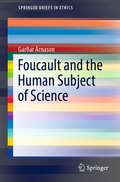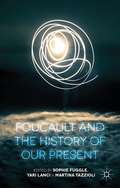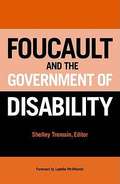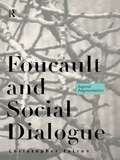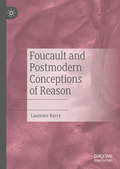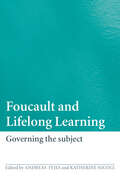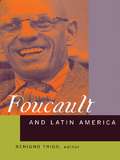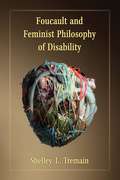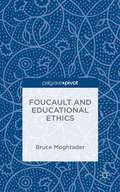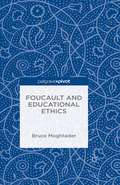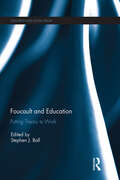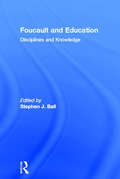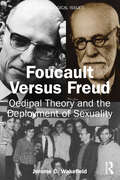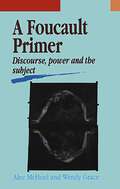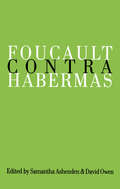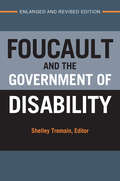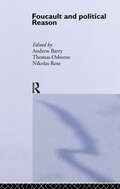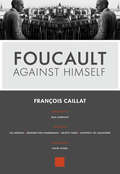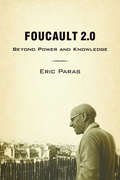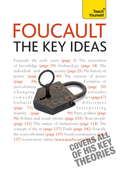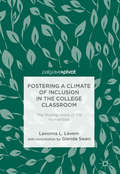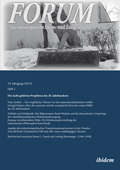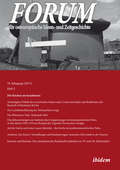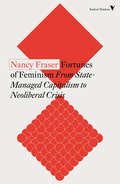- Table View
- List View
Foucault and the Human Subject of Science
by Garðar ÁrnasonThis book offers a clear analysis of Foucault’s work on scientific knowledge and its relationship to individuals and society. It suggests a way of using Foucault’s tools for science criticism and resistance, while avoiding the pitfalls of vulgar relativism or irrational anti-science views. Two cases of scientific conflict are considered. The first considers left-handers as subjects of science, in particular studies which purport to show that left-handers die on average younger than right-handers. The second case considers Icelanders as subjects of science in the context of a partly failed attempt to construct a genetic database encompassing the entire nation.The book will be of interest to bioethicists and philosophers who are concerned with the interaction between science and its human subjects, as well as scholars concerned with Foucault’s work on science.
Foucault and the History of Our Present
by Martina Tazzioli Sophie Fuggle Yari LanciAccording to Michel Foucault, the 'history of the present' should constitute the starting point for any enquiry into the past. This collection considers the continued relevance of Foucault's work for thinking the history of our present and includes essays and interviews by Judith Butler, Judith Revel, Mark Neocleous, and Tiziana Terranova.
Foucault and the Government of Disability
by Shelley TremainFoucault and the Government of Disability is the first book-length investigation of the relevance and importance of the ideas of Michel Foucault to the field of disability studies and vice versa. Over the last thirty years, politicized conceptions of disability have precipitated significant social change, including the landmark Americans with Disabilities Act in 1990, the redesign of urban landscapes, the appearance of closed-captioning on televisions, and the growing recognition that disabled people constitute a marginalized and disenfranchised constituency. The provocative essays in this volume respond to Foucault's call to question what is regarded as natural, inevitable, ethical, and liberating, while they challenge established understandings of Foucault's analyses and offer fresh approaches to his work. The book's roster of distinguished international contributors represents a broad range of disciplines and perspectives, making this a timely and necessary addition to the burgeoning field of disability studies. "A serious step forward not only for disability studies but for the range of theoretical positions associated with Foucault. Foucault and the Government of Disability will provide for years to come a basis for rethinking Foucault's impact on social theory as well as a foundation for active political struggle against the oppression of people with disabilities." -- Tobin Siebers, University of Michigan. "Testimony to the enduring power of Foucault's work to stimulate new ways of thinking about and resisting the pernicious effects of normalization within modern societies... Critically engaging Foucault as well as received interpretations of his work, this collection is intended for readers of Foucault as well as critical disability theorists. It delivers on its promise to stimulate us to think differently about both disability and Foucault." -- Jana Sawicki, Williams College. Shelley Tremain teaches in the Philosophy Department of the University of Toronto at Mississauga.
Foucault and Social Dialogue: Beyond Fragmentation
by Chris FalzonFoucault and Social Dialogue; Beyond Fragmentation is a compelling yet extremely clear investigation of these options and offers a new way forward. Christopher Falzon argues that the proper alternative to foundationalism is not fragmentation but dialogue and that such a dialogical picture can be found in the work of Michel Foucault. Such a reading of Foucault allows us to see, for the first time, the ethical and political position implicit in Foucault's work and how his work contributes to the larger debate concerning the death of man.
Foucault and Postmodern Conceptions of Reason
by Laurence BarryFor decades Foucault was mostly known for his diagnosis of modernity as a form of entrapment, both in our modes of thought and our behaviors. This book argues that Foucault's reappraisal of modernity occurs with the 1978 and 1979 lectures, in which he sketches modern power as governmentality and neoliberalism. From this perspective, Foucault’s once surprising studies on the Greeks' constitution of the ‘self’ can be seen as a continuation of his diagnosis of late modernity, and as an attempt to retrieve a form of autonomy for our modern selves. One finds in the late Foucault a postmodern conception of reason and not a destruction of reason; but this is possible only if postmodernity is seen as a critical exercise of reason in the analysis of norms.
Foucault and Lifelong Learning: Governing the Subject
by Andreas Fejes Katherine NicollOver the last twenty years there has been increasing interest in the work of Michel Foucault in the social sciences and in particular with relation to education. This, the first book to draw on his work to consider lifelong learning, explores the significance of policies and practices of lifelong learning to the wider societies of which they are a part. With a breadth of international contributors and sites of analysis, this book offers insights into such questions as: What are the effects of lifelong learning policies within socio-political systems of governance? What does lifelong learning do to our understanding of ourselves as citizens? How does lifelong learning act in the regulation and re-ordering of what people do? The book suggests that understanding of lifelong learning as contributory to the knowledge economy, globalisation or the new work order may need to be revised if we are to understand its impact more fully. It therefore makes a significant contribution to the study of lifelong learning.
Foucault and Latin America: Appropriations and Deployments of Discursive Analysis
by Benigno TrigoFoucault and Latin America is the first volume to trace the influence of Foucault's theories on power, discourse, government, subjectivity and sexuality in Latin American thought.
Foucault and Feminist Philosophy of Disability
by Shelley Lynn TremainFoucault and Feminist Philosophy of Disability is a distinctive contribution to growing discussions about how power operates within the academic field of philosophy. By combining the work of Michel Foucault, the insights of philosophy of disability and feminist philosophy, and data derived from empirical research, Shelley L. Tremain compellingly argues that the conception of disability that currently predominates in the discipline of philosophy, according to which disability is a natural disadvantage or personal misfortune, is inextricably intertwined with the underrepresentation of disabled philosophers in the profession of philosophy. Against the understanding of disability that prevails in subfields of philosophy such as bioethics, cognitive science, ethics, and political philosophy, Tremain elaborates a new conception of disability as a historically specifi c and culturally relative apparatus of power. Although the book zeros in on the demographics of and biases embedded in academic philosophy, it will be invaluable to everyone who is concerned about the social, economic, institutional, and political subordination of disabled people.
Foucault and Educational Ethics
by Bruce MoghtaderIn his works on ethics, Foucault turned towards an examination of one's relationship with oneself and others. This differs from the modern approaches that explore the relationship between and the responsibilities of actors to each other by adopting criteria. Ethical criteria engender assumptions about the actors by focusing on their responsibilities. Instead of relying on criteria, Foucault's writing and lectures contributed to an awareness of the activities we take upon ourselves as ethical subjects. His reconstruction of the Greco-Roman ethics seeks to examine the possibilities of the reconstitution and transformation of subjectivity. Through this, he offers an avenue of understanding the formation of ethical subjects in their educational interrelationships.
Foucault and Education: Putting Theory to Work (ISSN)
by Stephen J. BallSpecially selected by Stephen Ball, this is a collection of the best and most interesting recently published papers that ‘use’ Foucault to analyse, destablise and re-claim educational ‘problems’. Arguably the best known social theorist in the western world, Foucault’s work is now widely used by researchers and writers in many fields of social science. These papers not only demonstrate the practical applicability of Foucault to things ‘cracked’ and things ‘intolerable’ in making them ‘not as necessary as all that’; they are also transposable, in that they offer forms and methods of analysis which can be taken up and applied and used in other settings, sectors, and policy fields.
Foucault and Education: Disciplines and Knowledge (Routledge Library Editions: Michel Foucault)
by Stephen J. BallFirst published in 1990, this book was the first to explore Foucault's work in relation to education, arguing that schools, like prisons and asylums, are institutions of moral and social regulation, complex technologies of disciplinary control where power and knowledge are crucial. Original and challenging, the essays assess the relevance of Foucault's work to educational practice, and show how the application of Foucauldian analysis to education enables us to see the politics of educational reform in a new light.
Foucault Versus Freud: Oedipal Theory and the Deployment of Sexuality (Psychological Issues)
by Jerome C. WakefieldIn Foucault Versus Freud, Jerome C. Wakefield offers a novel analysis of one of the great intellectual clashes of our times, the attack on Sigmund Freud's influential sexual theories by the eminent French philosopher and historian of ideas Michel Foucault.Starting from Foucault's question, "What makes the psychoanalytic theory of incest acceptable to the bourgeois family?", and drawing on Foucault's relatively unexplored published lectures as well as his celebrated History of Sexuality, Vol. 1, Wakefield evaluates Foucault's argument that there is a continuity between the two-century medical anti-masturbation crusade and Freud's theory, providing the reader with an accessible introduction to Foucault's conceptual innovations including power/knowledge, the deployment of sexuality, and the use of surveillance and confession as tactics in medicalizing sexuality and reshaping family life.Rather than allowing the argument to stay at the evidentially uncertain level one often finds in Foucault's writings, Wakefield undertakes close readings of both Freud's "seduction-theory" texts and later Oedipal-period texts to test whether Foucault's provocative arguments find support or disconfirmation. Despite identifying weaknesses in Foucault's position, Wakefield argues that a careful look at Freud's sexual theories through Foucault's theoretical lens changes forever the way one sees Freud's theory—and has the potential to help psychoanalysis move forward in a constructive way.This book is written to be understandable for those who are not steeped in philosophy or familiar with Foucault's philosophy, offering a lucid introduction to Foucault's ideas and his clash with Freud that will be of interest to clinicians, students, and scholars alike.
Foucault Primer: Discourse, Power and the Subject
by Alec McHoul Wendy GraceWho are we today? That deceptively simple question continued to be asked by the French historian and philosopher, Michel Foucault, who for the last three decades has had a profound influence on English-speaking scholars in the humanities and social sciences. A Foucault Primer is designed for undergraduates and others who feel the need of some assistance when coming to grips with Foucault's voluminous and complex writings. Instead of dealing with them chronologically, however, this book concentrates on some of their central concepts, primarily Foucault's rethinking of the categories of discourse, power and the subject (or subjection). Foucault's writings contribute collectively to what he himself calls 'an ontology of the present'. His historical research was always geared towards showing how things could have been (and still could be) otherwise. This is especially the case with respect to the production of human subjects.
Foucault Contra Habermas: Recasting the Dialogue between Genealogy and Critical Theory (Social Theory Ser.)
by David Owen Samantha AshendenFoucault contra Habermas is an incisive examination of, and a comprehensive introduction to, the debate between Foucault and Habermas over the meaning of enlightenment and modernity. It reprises the key issues in the argument between critical theory and genealogy and is organised around three complementary themes: defining the context of the debate; examining the theoretical and conceptual tools used; and discussing the implications for politics and criticism. In a detailed reply to Habermas' Philosophical Discourse of Modernity, this volume explains the difference between Habermas' philosophical practice and Foucault's between the analytics of truth and the politics of truth. Many of the most difficult arguments in the exchange are subject to a detailed critical analysis. This examination also includes discussion of the ethics of dialogue; the practice of criticism; the politics of recognition , and the function of civil society and democracy.
Foucault And The Government Of Disability
by Shelley Lynn TremainFoucault and the Government of Disability considers the continued relevance of Foucault to disability studies, as well as the growing significance of disability studies to understandings of Foucault. A decade ago, this international collection provocatively responded to Foucault's call to question what is regarded as natural, inevitable, ethical, and liberating. The book's contributors draw on Foucault to scrutinize a range of widely endorsed practices and ideas surrounding disability, including rehabilitation, community care, impairment, normality and abnormality, inclusion, prevention, accommodation, and special education. In this revised and expanded edition, four new essays extend and elaborate the lines of inquiry by problematizing (to use Foucault's term) the epistemological, political, and ethical character of the supercrip, the racialized war on autism, the performativity of intellectual disability, and the potent mixture of neoliberalism and biopolitics in the context of physician-assisted suicide. "[A]n important, prescient, and necessary contribution. . . a kind of litmus test for the efficacy of Foucault's concepts in the study of disability, concepts that lead to a refusal of the biological essentialism implied in the disability/impairment binary. " --Foucault Studies "Tremain has done an exceptional job at organizing and procuring important, rigorously argued, and entertaining essays. . . . This book should be a mandatory read for anyone interested in contemporary philosophical debates surrounding the experience of disability. " --Essays in Philosophy "A beautiful exploration of how Foucault's analytics of power and genealogies of discursive knowledges can open up new avenues for thinking critically about phenomena that many of us take to be inevitable and thus new ways of resisting and possibly at times redirecting the forces that shape our lives. Every scholar, every person with an interest in Foucault or in political theory generally, needs to read this book. " --Ladelle McWhorter, University of Richmond
Foucault And Political Reason: Liberalism, Neo-Liberalism And The Rationalities Of Government
by Nikolas Rose Andrew Barry Thomas OsborneFoucault is often thought to have a great deal to say about the history of madness and sexuality, but little in terms of a general analysis of government and the state.; This volume draws on Foucault's own research to challenge this view, demonstrating the central importance of his work for the study of contemporary politics.; It focuses on liberalism and neo- liberalism, questioning the conceptual opposition of freedom/constraint, state/market and public/private that inform liberal thought.
Foucault Against Himself
by Arlette Farge Georges Didi-Huberman Leo Bersani François Caillat Geoffroy De LagasnerieIn his private life, as well as in his work and political attitudes, Michel Foucault often stood in contradiction to himself, especially when his expansive ideas collided with the institutions in which he worked.<P><P> In Francois Caillat's provocative collection of essays and interviews based on his French documentary of the same name, leading contemporary critics and philosophers reframe Foucault's legacy in an effort to build new ways of thinking about his struggle against society's mechanisms of domination, demonstrating how conflict within the self lies at the heart of Foucault's life and work.Includes a foreword written especially for this edition by Paul Rabinow, Professor of Anthropology at the University of California (Berkeley) and an influential writer on the works of Foucault; he is the co-editor of The Essential Foucault.Foucault against Himself features essays and interviews by:Leo Bersani, American Professor Emeritus of French at the University of California (Berkeley) and the author of Homos;Georges Didi-Huberman, French philosopher and art historian; his most recent book is Gerhard Richter: Pictures/SeriesArlette Farge, French historian and the author of The Allure of the Archives;Geoffroy de Lagasnerie, French philosopher and the author of La derniere lecon de Michel Foucault.
Foucault 2.0: Beyond Power and Knowledge
by Eric ParasA dramatically new interpretation of the development of the thought of Michel Foucault, one of the 20th century's most influential thinkers.In this lucid and groundbreaking work, Eric Paras reveals that our understanding of the philosophy of Michel Foucault must be radically revised. Foucault's critical axes of power and knowledge -which purposefully eradicated the concept of free will- reappear as targets in his later work. Paras demonstrates the logic that led Foucault to move from a microphysics of power to an aesthetics of individual experience. He is the first to show a transformation that not only placed Foucault in opposition to the archaeological and genealogical positions for which he is renowned, but aligned him with some of his fiercest antagonists.Foucault 2.0 draws on the full range of the philosopher's writing and of the work of contemporaries who influenced, and sometimes vehemently opposed, his ideas. To fill the gaps in Foucault's published writings that have so far limited our conception of the arc of his thought, Paras analyzes the largely untapped trove of lectures Foucault delivered to teeming Paris audiences as Professor of the College de France for more than a decade. At the same time, Foucault 2.0 highlights the background against which Foucault carried out his most foundational work: the unrest of 1968, the prison reform movement of the early 1970s, and the Iranian Revolution of 1979. Carefully assembling the fragments of a thinker who remains but half-understood, Eric Paras has composed a seminal book, essential reading for novices and initiates alike.
Foucault - The Key Ideas: Foucault on philosophy, power, and the sociology of knowledge: a concise introduction (Teach Yourself Educational)
by Paul OliverFoucault - The Key Ideas is a concise introduction to the life, works and ideas of this ground-breaking modern philosopher. This book will not only guide you through the events of Foucault's life and help you to understand his most complex ideas with ease; it will also demonstrate the practical impact of those ideas on life today. Covering everything from Foucault's views on the philosophy and sociology of knowledge to his analysis of power and institutions in society, this book offers a fascinating insight into the legacy of this revolutionary thinker. NOT GOT MUCH TIME? One, five and ten-minute introductions to key principles to get you started. AUTHOR INSIGHTS Lots of instant help with common problems and quick tips for success, based on the author's many years of experience. TEST YOURSELF Tests in the book and online to keep track of your progress. EXTEND YOUR KNOWLEDGE Extra online articles at www.teachyourself.com to give you a richer understanding of study skills. FIVE THINGS TO REMEMBER Quick refreshers to help you remember the key facts. TRY THIS Innovative exercises illustrate what you've learnt and how to use it.
Foucault - The Key Ideas: Foucault on philosophy, power, and the sociology of knowledge: a concise introduction (Teach Yourself Educational Ser.)
by Paul OliverFoucault - The Key Ideas is a concise introduction to the life, works and ideas of this ground-breaking modern philosopher. This book will not only guide you through the events of Foucault's life and help you to understand his most complex ideas with ease; it will also demonstrate the practical impact of those ideas on life today. Covering everything from Foucault's views on the philosophy and sociology of knowledge to his analysis of power and institutions in society, this book offers a fascinating insight into the legacy of this revolutionary thinker.NOT GOT MUCH TIME?One, five and ten-minute introductions to key principles to get you started.AUTHOR INSIGHTSLots of instant help with common problems and quick tips for success, based on the author's many years of experience.TEST YOURSELFTests in the book and online to keep track of your progress.EXTEND YOUR KNOWLEDGEExtra online articles at www.teachyourself.com to give you a richer understanding of study skills.FIVE THINGS TO REMEMBERQuick refreshers to help you remember the key facts.TRY THISInnovative exercises illustrate what you've learnt and how to use it.
Fostering a Climate of Inclusion in the College Classroom: The Missing Voice Of The Humanities
by Lavonna L. Lovern Glenda SwanThis book examines inclusion teaching at the college and university level. It establishes the importance of the Humanities disciplines and the use of qualitative analysis as a means of understanding and encouraging democratic materials and classroom organization. The first section of the text provides two primers for those unfamiliar with pedagogical history and theory. These primers are designed to give basic information and sources for additional study. They trace pedagogical influences from foundationism, neoliberalism, conflict, and critical theories to critical race theory, Red pedagogy, and decolonization theories. The second half of the book focuses on strategies to assist those attempting classroom inclusion. These chapters are designed to assist with practical ways in which inclusion can be advanced as well as strategies to assist junior faculty in the navigation of the politics of inclusive education.
Forum für osteuropäische Ideen- und Zeitgeschichte: Die Kirchen im Sozialismus am Beispiel Russlands und Polens
by Leonid Luks John Andreas Fuchs Gunter Dehnert Nikolaus Lobkowicz Andreas Umland Alexei RybakovSince 1997, FORUM has been an integral part of the landscape of European studies. In addition to contemporary history, it offers insights into the history of ideas and reviews books on Central and Eastern European history. It offers more than just history—for instance, interdisciplinary discussions by political scientists, literary, legal, and economic scholars, and philosophers. FORUM sees itself as a bridge between East and West. Through the translation and publication of texts and contributions from Russian, Polish, and Czech researchers, it offers the Western reader access to the scholarly discourse of Eastern Europe.The 'short' 20th century is one of the best-documented eras in history. Nevertheless, it holds more mysteries than many periods of antiquity or the Middle Ages of which we have only sparse relics. One of the biggest mysteries is the question of the causes of the collapse of civilization in the first half of the century. In Germany as well as in Russia, regimes came to power invoking the implementation of utopias that had been dreamt up during the 'long' 19th century yet which had been considered unrealizable. Now, it turned out, even the most radical utopian blueprint could be put into place. This development, intertwined with an extraordinarily deep crisis of European democracy, did not happen overnight. It had been looming for a long time. There had even been several prescient voices heralding the upcoming crisis—trailing away without being noticed. Volume 19, Issue 1 of FORUM recognizes some of these unheard prophets and scrutinizes their writings.
Forum für osteuropäische Ideen- und Zeitgeschichte: Die Kirchen im Sozialismus am Beispiel Russlands und Polens
by Leonid Luks John Andreas Fuchs Gunter Dehnert Nikolaus Lobkowicz Alexei Rybakow und Andreas UmlandSince 1997, FORUM has been an integral part of the landscape of European studies. In addition to contemporary history, it offers insights into the history of ideas and reviews books on Central and Eastern European history. It offers more than just history—for instance, interdisciplinary discussions by political scientists, literary, legal, and economic scholars, and philosophers. FORUM sees itself as a bridge between East and West. Through the translation and publication of texts and contributions from Russian, Polish, and Czech researchers, it offers the Western reader access to the scholarly discourse of Eastern Europe.This issue examines the fate of organized religion under state socialism. While totalitarianism means a rupture in the traditional idea of man, the church stands for continuity. That is why totalitarian rulers quest to expel the church from public perception and, at the same time, try to usurp the church from within. This volume is dedicated to investigating how this process took place in the countries of the former Soviet bloc.
Fortunes of Feminism
by Nancy FraserNancy Fraser's major new book traces the feminist movement's evolution since the 1970s and anticipates a new--radical and egalitarian--phase of feminist thought and action.During the ferment of the New Left, "Second Wave" feminism emerged as a struggle for women's liberation and took its place alongside other radical movements that were questioning core features of capitalist society. But feminism's subsequent immersion in identity politics coincided with a decline in its utopian energies and the rise of neoliberalism. Now, foreseeing a revival in the movement, Fraser argues for a reinvigorated feminist radicalism able to address the global economic crisis. Feminism can be a force working in concert with other egalitarian movements in the struggle to bring the economy under democratic control, while building on the visionary potential of the earlier waves of women's liberation. This powerful new account is set to become a landmark of feminist thought.
